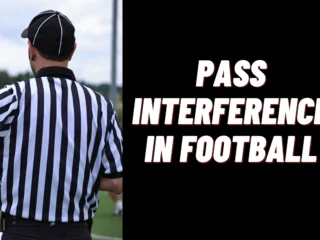Last Updated on April 8, 2024 by Umer Malik
Pass interference can completely change the outcomes of any football match. It’s a common penalty that’s often used during college, high school and professional football games. Why is pass interference so important?
Pass interference occurs the situation where a member of the defense stops an offensive player from catching football. The ruling states the defensive player may not contact the offensive player while the ball is in the air. If the defensive player does so, it will be deemed pass interference.
This article will go over everything you require about pass interference.
Defensive Interference with Pass
Pass interferences that are defensive could drastically alter the flow of any football match. This rule was established when forward passes were allowed.
The pass interference rule was implemented to give the player trying to catch the ball the right to catch it without a defender interfering.
There are a variety of reasons the referee may throw an flag for pass interference.
The most frequent kind of pass interference occurs when two players are trying to catch the football but the player on defense is too aggressive. The referee is usually the one to decide to throw the penalty flag.
The defensive player has to give the offensive player the chance to get the ball.
The offensive player doesn’t enjoy the same rights as the defensive player. That means that when a defensive player is focused on the football and is in a position to catch the ball, they could attempt to catch it, or throw it away.
Also check: AB de Villiers | Abhinav Bindra
The penalty flag is usually placed when a defensive player does not make an effort to put themselves into position to play the football in the air. Instead, they make too excessive contact with the receiver, which results in a penalty flag.
Penalty For Interference With Passes
If the official of the football decides that the player who was defensive had too much contact with the wide receiver they will throw an official flag instead of trying to catch the football.
Based on the level of play at, the penalty flag will be different. The penalties are those that every football league can use.
- High School 15 Yard Penalty at the Line of Scrimmage
- College 15 Yard Penalty on the Line Of Scrimmage and automatic First Down
- Professional: Automatic First Down, and the Ball is located where the Penalty Was Committed
As you will see, the penalty for interference in the pass is more serious at the professional level than it is at the college or high school levels.
High school pass interference does not necessarily mean that it’s the first down. NFHS Rules stipulate that if an offense has 3rd or 20 yards, and a pass interference occurs in the following play, the team will continue the play.
It’s more secure to do this in college. The referee will send an off-side flag for 15 yards, and the offense is automatically granted a first down.
Rules for pass interference at the professional level like the NFL are the most strict. The rules demand that the ball be immediately transferred to the location in which pass interference occurred in the event of a penalty flag being put up. The offense also receives the benefit of an automatic first down.
This call has had many implications for teams who are trying to throw the ball into the field late into games.
Fans, players, coaches and others debate the pass interference call all the time.
Interference by Passes
While defense is usually penalized for pass interference, there is an offense for pass interference too.
This link provides a fantastic visual illustration of offensive pass interference.
If the ball is still in the air, the player who is the offensive one could be accused of offensive pass interference in the event that they engage in too much contact or attempt to intercept the ball.
The result of offensive interference with a pass is that the penalty of 15 yards for offense.
For instance, if a penalty occurred on a play that was 2nd and 10 following the penalty, it’ll be 2nd and 25. This is only the case if the penalty is accepted by the defense (high school or college).
This is a relatively rare penalty however, it is possible to get it. Pass interference calls are usually up to the discretion of the referee. While some referees won’t throw a flag at all however, other referees might. It’s all based on what the referee considers to be their interpretation of pass interference.
Also check: Anjali Bhagwat | Anju Bobby George
Apart from this if you’re interested to know about Trendy Sports Wear for Women then please visit our Sports category.


























